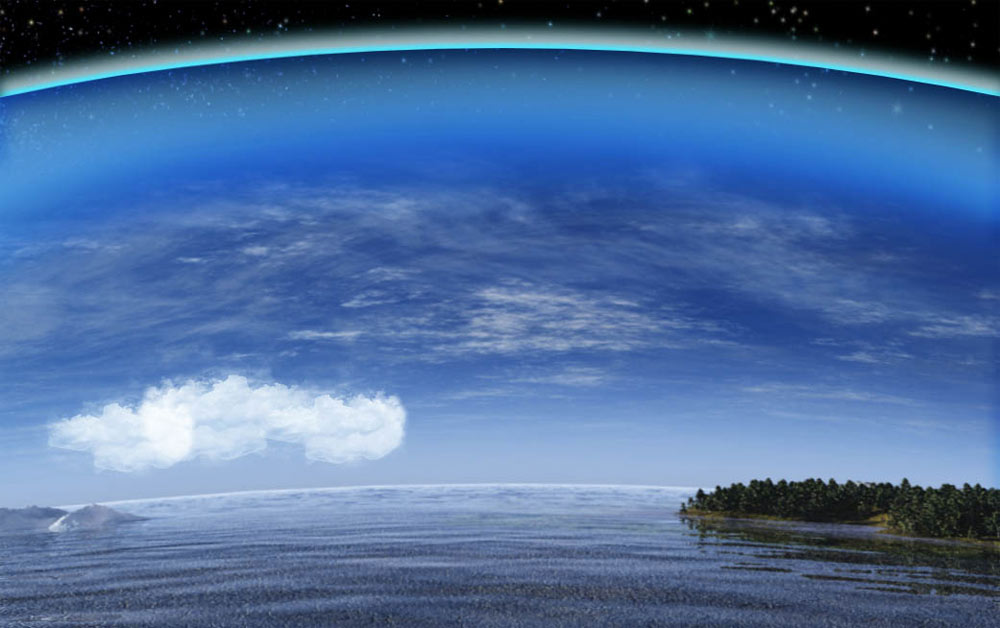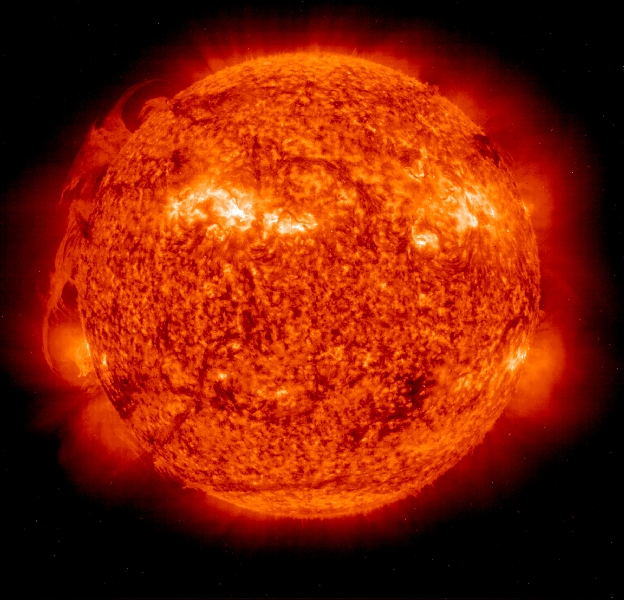The Climate Change Debate: Man vs. Nature

The public discussion on climate change has become so polarized that some scientists don't even acknowledge there is a debate. Climate scientist at NASA's Goddard Institute for Space Studies, Gavin Schmidt, is one of those people. "There aren't 'two sides' to the science, nor to the policy response," Schmidt said. "This implies that the whole thing is just a matter of an opinion – it is not." Another group of scientists would disagree with Schmidt. In June, the Sixth International Conference on Climate Change took place in Washington D.C. It was organized by The Heartland Institute, headquartered in Chicago, and its primary objective is to "dispute the claim that global warming is a crisis." In 2008, the organization published a report titled "Nature, Not Human Activity, Rules the Climate." Its president, Joseph Bast, talking to the journal Nature recently, discussed public opinion on climate change and the ongoing debate. "We've won the public opinion debate, and we've won the political debate as well," Bast said, "but the scientific debate is a source of enormous frustration." The climate change debate, as it discussed in the mainstream media, appears to be divided into two major sides. One side argues that the current global warming is caused by human factors while the other side insists it is occurring because of natural forces. In the latter argument, two natural causes that dominate the conversation are solar changes and changes to the Earth's orbit. [10 Surprising Results of Global Warming] The Sun's Energy Scientists and astronomers have studied the impact of the Sun on the Earth's climate as far back as the early 1800s. Historians have traced the earliest such studies to the research of Sir William Herschel, who tried to link the frequency of sunspots to the price of wheat. His belief was that the number of sunspots would be indicative of the amount of the Sun's energy that is received by the Earth. That energy would affect the amount of wheat produced, which would affect the price.
Herschel’s study didn’t make a big impact at the time because he did not have access to historical temperature records to make any useful comparisons. However, there has been a significant amount of research conducted since then to show that variations in the Sun's energy output have an impact on changes in Earth’s climate.
A research study published earlier this year in the Journal of Atmospheric and Solar-Terrestrial Physics provides more evidence of this link between the Sun and the Earth. Through their analysis of historic temperature deviations, geomagnetic activity and the frequency of sunspots, the authors concluded that “the Sun has a significant role to play in the long-term and short-term climate change.” “With more and more data available, it may provoke some thought to further explore the solar influence on Earth's climate with geomagnetic activity acting as a possible link,” said lead author Mufti Sabi ud din, scientist of the Astrophysical Sciences Division at the Bhabha Atomic Research Center in India's Department of Atomic Energy. “It may evoke some response so as to bring to the fore the substantial role of the natural forcing at work on the observed climate variability.” Mufti, however, did note that the evidence of the Sun and other natural forces being the primary cause for climate change is still inadequate. “We do not rule out the natural forcings at work,” he said, “but there isn't enough quantitative evidence to say that natural forcings are the dominant cause of current climate change.” Pointing out the geopolitical sensitivity of the topic itself, Mufti was careful not to rule out anthropogenic effects.
“We have made it amply clear that the anthropogenic origins cannot also be ruled out,” Mufti said. According to Schmidt, while the Sun does have some impact, it is definitively not the reason for current patterns of climate change. “There is an effect,” Schmidt said, “but it is hard to detect in surface records, and is certainly not responsible for recent trends.” Orbital Change Another natural occurrence that has caused major changes in the Earth's climate in the past is shifts in the Earth's orbit. Consider the Sahara desert, for example. There is a wide acceptance among scientists that the Sahara transformed from a fertile grassland to a desert because of a change to the Earth's orbit. This shift in how the Earth circled the Sun affected the amount of sunlight that region of Africa received. The Earth's orbital tilt is said to vary between 22 and 25 degrees roughly every 41,000 years. While a natural event such as this could bring about major changes to the climate, some scientists are warning that there is a possibility for reverse feedback. In other words, instead of an orbital tilt causing climate change, such as the one that took place in the African continent, current changes in climate could end up causing changes in the Earth's axial tilt. In an article published late last year, Astrobiology Magazine reported on such a prediction: “Scientists from NASA's Jet Propulsion Laboratory say that the current melting of ice in Greenland is already causing the tilt to change at a rate of approximately 2.6 centimeters each year. They predict that his change could increase in the years ahead.” The Politics of Climate
Hundreds of scientists around the world have conducted research that show human activities contribute the most to today’s climate change. We are changing the Earth’s atmosphere by emitting huge amounts of greenhouse gases such as carbon dioxide, most of which comes from the burning of fossil fuels. Other human activities include agriculture and changes in land-use patterns. They all work to tip the Earth’s energy balance by trapping more heat. Even scientists who think human activity is the main cause of climate change don't deny that natural changes will cause temperature fluctuations on Earth. However, their argument is that in the current cycle of climate change, the impact caused by man is far greater. But there’s no indication that the two sides of the climate change debate will reach any common ground in the near future on what scientific evidence is showing, or what policy decisions should be adopted. Perhaps the most well-known spokesperson for climate change, former U.S. Vice President Al Gore, recently attracted a lot of media attention for his emotional rant against climate skeptics. When he spoke at the Aspen Institution in Boulder, Colorado in early August, he compared climate skeptics to those who argued that smoking was not harmful to human health in the 1960s. "There are about 10 other memes that are out there, and when you go and talk to any audience about climate, you hear them washing back at you the same crap, over and over and over again,” Gore said. “There is no longer shared reality on an issue like climate, even though the very existence of our civilization is threatened." Although the climate scientists who say that the climate is changing (about 97 percent by some estimates) far outnumber those who don’t, Gore's comments indicate the strength of the message of those who argue against climate change.
The Brookings Institute released a report in April on the public opinion on climate change in the United States and Canada. In a survey of 2,130 people, the report found that there is a progressive decrease in the number of people who think there is “solid evidence of global warming” and an increase in the number who think there is no solid evidence. In the fall of 2008, 17 percent of people did not believe in global warming. In the fall of 2010, that number had increased to 26 percent. Even though the number of climate change believers has decreased, the majority of people still believed that the Earth is undergoing global warming and most of them (61 percent of Americans and 57 percent of Canadians) felt it was a “very serious” problem. Moving On Despite knowing the difference between weather and climate, both climate supporters and opponents, usually in politics and media, often can't refrain from using short-term weather patterns to bolster their respective arguments. Harsh winters are used as evidence of no global warming while scorching summers are used to support the viewpoint of human-caused warming of the Earth. Individual seasonal weather events such as a “snowmageddon” or heat waves cannot be directly attributed to either argument of the climate change debate because such events alone are temporary affects. Climate change, on the other hand, is a long-term problem. However, an increasing frequency of such extreme weather events can be another indication that climate change is in fact a reality. In this complex and seemingly never-ending debate, there is now an increasing number of scientists and other observers who say researchers and policymakers need to move on, to respond to the Earth's reactions to global warming instead of still debating whether or not it is a reality.
Climate change effects nearly every other sector of society. Take, for example, public health. Some of the diseases that impact global populations the most, such as malaria and diarrhea that kill millions each year, are highly sensitive to climatic conditions. Then there is the inequity of these risks. China is now the world’s top emitter of greenhouse gases, but developed countries, primarily the United States, is still mainly responsible for causing climate change after having emitted the most pollution for the longest time. But the populations that suffer the most from climatic changes will be those in developing countries – countries that have contributed the least to climate change and populations who have the least access to resources that could help them deal with the consequences. There are numerous other reports which show the impact of climate change on various other sectors such as agriculture, energy, insurance and even national security. Schmidt expressed the urgency of addressing climate change now. "The consequences of climate change increase, and they increase quite rapidly as the temperatures rise," Schmidt said. "The faster we act, the less bad the peak warming will be. It will take a long time to turn this around." But Schmidt rejects the idea that there is a point of no return. "This idea that there's just one point, I think that makes people complacent now and then it would make people fatalistic afterwards," Schmidt said. "Whatever the situation is, there will be choices that we can make as a society that will make it better in the future or worse. The longer we let it go without doing anything, the worse the consequences will be before it comes back down and we get it back under control, but there's never a point at which there's nothing that can be done. There is an urgency to acting but it's not because there's a point of no return."
Get the world’s most fascinating discoveries delivered straight to your inbox.
This story was provided by Astrobiology Magazine, a web-based publication sponsored by the NASA astrobiology program.



